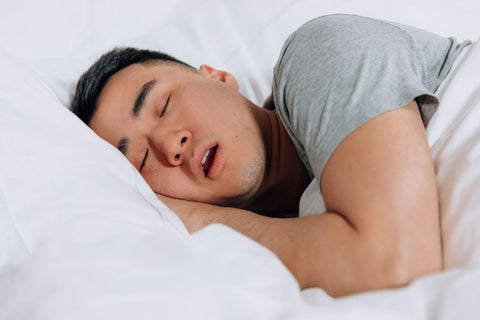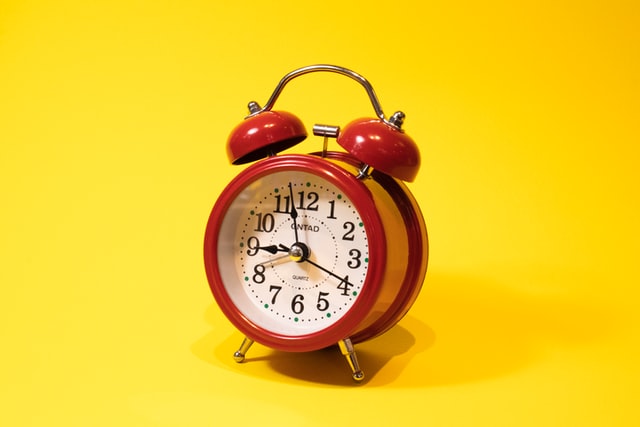If you find yourself waking up tired after eight hours of sleep, you aren’t alone.
Nearly half of all Americans report feeling sleepy throughout the day between three and seven days each week.
Around 35 percent of U.S. adults say they sleep less than seven hours per night, which could explain why so many people feel groggy and tired each day.
However, upping your sleeping time might not always be the quick fix you might think.
In fact, sleeping more on the weekends to make up for lost sleep doesn’t make up for the damage already caused by sleep deprivation in the long term.
An Eight Hour Lie?
A lack of sleep is associated with a myriad of health problems like diabetes, heart failure, depression, and more.
Many people have heard that getting eight hours of sleep per night is the standard, recommended amount of shut-eye.
Even so, they find themselves waking up tired after their prescribed eight hours of sleep.

Why? Because there isn’t a one-size-fits-all fix to the amount of sleep we need each night. We each need different amounts throughout different phases of our lives.
For example, newborn babies need between 14 and 17 hours, while infants need at least 12 to 15 hours each night.
Toddlers need between 11 to 14 hours of sleep every night, while preschoolers need 10 to 13.
School-aged children need at least nine to 11 hours, while teenagers need between 8 and 10 hours of shut-eye every evening.
Finally, grown adults need between seven and nine hours every night, while older adults can get by with about seven to eight hours.

You may need more sleep if you’re dealing with an illness or a specific condition, too.
Historically, sleeping in one chunk hasn’t always been the norm, either. Humans used to sleep in at least two separate chunks overnight. This pattern is known as “biphasic sleep.”
The History of Biphasic Sleep
If you’re still waking up tired after eight hours of sleep, it could be because you sleep in one solid block of time.
Have you ever woken up in the middle of the night, unable to go back to sleep? Some evidence suggests that waking up in the wee hours of the evening used to be part of our routine.
There have been many recorded accounts of segmented sleep throughout history, including medical texts, court records, personal diaries, and literature.
Most of these recordings note a “first” and “second” sleep throughout the night.
Households retired after the sun went down, falling asleep for the first time throughout the evening.
After a few hours passed, they would wake up and spend a couple of hours doing leisurely activities, like reading or sewing.
From there, they would fall asleep a second time for four to five hours, waking to start a new day after the sun would rise.
Humans have also historically slept in shifts to switch off monitoring for danger or threats.@somnifix Eight hours of #sleep hasn’t always been the norm! 💡 #biphasicsleep #didyouknow #learnontiktok #historytok #industrialrevolution ♬ Seen It All - Nike Featuring Chong The Nomad
This type of sleep schedule fell out of fashion with the invention of electricity, which allowed for longer working hours and altered our schedules to one long chunk of sleep each night.
Some people have tried a biphasic model in modern times in an attempt to boost productivity, like Craig Benzine, who tried sleeping in two shifts for over two months.
He reported noticing benefits while following this schedule, noting that he was able to get a bit of work done in between both periods of sleep since no one was around to distract him.
He also noticed deeper sleep, more vivid dreams, and feeling more rested overall. That said, many factors play a role in the type of sleep schedule each individual should follow.
As we discussed earlier, sleep isn’t a one-size-fits-all situation. Believe it or not, the amount of sleep you need and the schedule most beneficial to receive it depends on your genetic makeup.
Genetics of Sleep
If you suffer from insomnia, it may have been passed down from your parents. Your genetics determine how many hours of sleep you need every night.
In fact, your genes play a role in how long you need to sleep each night, what time you prefer to sleep, and how sleep deprivation affects your body and mind.

For example, one genetic mutation called the “short sleep” gene causes those who have it to be able to get by with only six hours of sleep each night.
Research shows that those without this mutation need eight hours on average, for comparison.
Other genes determined that some people are more adversely affected by a lack of sleep than others, while some people may sleep deeper compared to those who sleep lighter.
This brings truth to the phrase “light” or “heavy” sleeper!
Since your genetic makeup isn’t something you can alter, it’s important to pay attention to how you feel to decide whether you’re getting an adequate amount of sleep.
Believe it or not, there is such a thing astoo muchsleep.
The Dangers of Oversleeping
We’ve already touched on the dangers of sleep deprivation, but what about the risks of sleeping too much?
Your risk of stroke, heart disease, diabetes, and even death increase if you sleep more than nine hours per night regularly.

Many people oversleep if they didn’t get enough rest the night before, or they wait until the weekend to repay their sleep “debt.”
As a result, the risk of developing sleep disorders like sleep apnea rises.
That’s why it’s vital to listen to your body and improve your sleep quality by finding the proper amount of sleep for you.
Think “The Three Bears” here: you don’t want too much or too little. It needs to be just right.
So where should you start? Research from the Huberman Lab offers sleep guidelines that anyone can apply.
Huberman Lab Sleep Recommendations
Andrew Huberman, Ph.D. is a neuroscientist and professor at the Stanford University School of Medicine.
He is responsible for developing tools that are now used by the military to optimize performance in stressful environments, enhance neuroplasticity, and improve sleep.
Work from the Huberman Lab has been published in top scientific journals. In 2021, the Huberman Lab podcast was launched to further spread Huberman Lab Sleep and health recommendations discovered through research.
In an episode with Dr. Matt Walker, the two doctors discussed the various stages of sleep, the dangers of sleep deprivation, and the biology of sleep.
The two also discussed their recommendations for improving sleep based on actionable tools and tips supported by scientific research, including:
- Get at least ten minutes of sunlight within the first 30 minutes to one hour upon waking to reset your circadian rhythm. Then, get more sun in the late afternoon before sunset.
- Wake up and go to sleep at the same time each day, even on the weekend, and implement a nighttime routine you can follow every evening. This keeps your internal clock in check.
- Limit your caffeine and alcohol intake. Avoid drinking caffeine within eight to ten hours of bedtime. Caffeine has a longer half-life than you may think, blocking the adenosine receptors in the brain and keeping us from feeling tired.
- Avoid bright artificial light, including blue light from digital devices, between 10 PM and 4 AM. This light tricks your body into thinking it’s daytime when it’s actually nighttime. Blue light glasses may block some artificial light, while candlelight and moonlight won’t throw off your internal clock.
- Limit daytime naps to less than 90 minutes to avoid throwing off your sleep schedule. Avoid taking naps after 4 PM.
- Take supplements that support quality sleep, like magnesium, theanine, or GABA.
- Keep your room cool and dark. Your body temperature needs to drop in order for you to fall and stay asleep. If it’s too warm, temperature increases may cause you to wake up.
Aside from these Huberman Lab sleep recommendations, we suggest one final tip: tape your mouth shut at night for restorative sleep!
Use Mouth Tape for Restorative Sleep
If you don’t breathe properly during sleep, your airway will become blocked.
Mouth breathing is a dysfunctional method of breathing. It places the body in a state of constant stress, lowers oxygenation, and leads to snoring.

As a result, your sleep becomes fragmented, causing you to wake up groggy no matter how long you rest.
Nasal breathing while you sleep ensures that you won’t snore, so you’ll wake up free from headaches and dry mouth.
Most importantly, you’ll feel well-rested, as nasal breathing is the body’s preferred breathing method.
Moreover, it takes your body out of fight-or-flight mode by activating the parasympathetic nervous system, placing you in a state of rest that ensures quality sleep.
But how do you keep your mouth from falling open if you’re sound asleep? Mouth tape.

Although it sounds outlandish, mouth tape is proven to help you nasal breathe through the night, preventing snoring and promoting proper breathing along the way.
Before you grab just any tape, pause. The chemicals in the adhesives of most tapes are known to cause rashes and irritation.
SomniFix, on the other hand, was designed with your skin in mind.

Our Mouth Strips are hypoallergenic, latex and gluten-free, and feature a gel-like adhesive that provides a fit that’s so comfortable, that you’ll forget you’re wearing mouth tape at all.
Stop waking up tired after eight hours of sleep once and for all. Let SomniFix help you achieve the proper amount of restorative sleep you desperately need tonight!



